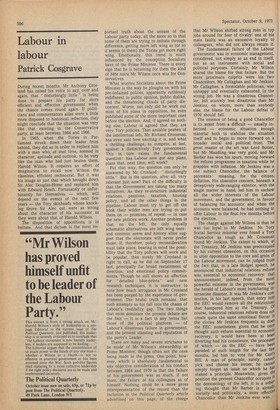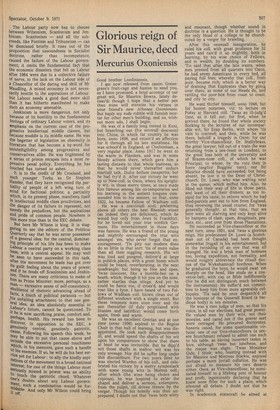Labour in labour
Patrick Cosgrave
During recent months, Mr Anthony Crosland has raised his voice to say, over and again, that " disturbingly little " is being done to prepare his party for more efficient and effective government when the chance comes round again. If politicians and commentators alike were a little more disposed to historical reflection, they might conclude that the situation was very like that existing in the Conservative party, at least between 1964 and 1966.
In 1965, when the Tories in Parliament struck down their leader from behind, they. did so in order to replace him with a man who, at that time, seemed in charaeter, aptitude and outlook, to be very like the man who had just beaten them, Harold Wilson. It requires an effort of imagination to recall now Wilson the classless, efficient technocrat. But it was his image as just that which brought down Sir Alec Douglas-Home and replaced him with Edward Heath. Fortunately or unfortunately for themselves — which, will depend on the events of the next few years — the Tory skinheads whose knocking drove Sir Alec out were as wrong• about the character of his successor as they were about that of Harold Wilson.
The disposition of oppositions is to imitate. And that dictum is the most im
portant truth about the unease of the Labour party today, all the more so in that some of them are trying to imitate through difference, getting more left wing as (or so it seems to them) the Tories get more right wing. Emotionally, this trend is much influenced by the conception Socialists have of the Prime Minister. There is every sign that he is becoming for them the kind of bête noire Mr Wilson once was for Conservatives.
What worries Socialists about the Prime Minister is the way he ploughs on with his pre-ordained polices, apparently ruthlessly indifferent to public opinion, public dislike, and the threatening clouds of party discontent. Worse, not only did he work out most of his plans in opposition, he even published some of the more important ones before the election. And, if agreed on nothing else, Labour is agreed that they are very Tory policies. That amiable peahen of the intellectual left, Mr Richard Crossman, has even said how exciting it is, and what a thrilling challenge, to compete, at last, against a distinctively Tory government. This in turn raises the fundamental question : has Labour now got any plans, plans that, next time, will work?
Put that way, the question can only be answered by Mr Crosland : " disturbingly little." But is the question, after all, very relevant just now? Part of the difficulty is that the Government are taking too many initiatives. As they re-structure industrial relations, pensions, taxation, housing policy, and all the other things in the pipeline, Labour must try to get off the hook their wilder men are trying to put them on — promises of repeal — in case the new policies work. Another problem is that, on the left, the only equally schematic alternatives are left wing ones : and common sense and history alike suggest that the electorate will never prefer those. If, therefore, policy reconsideration must take place, bearing in mind the possibility that the Tory policies will work and be popular, then surely Mr Crosland is right to call, as he did on September 17 last, principally for broad restatement of direction, and emotional policy commitments. Though he still shows an affection for 'detailed blue-prints' and new research techniques, it is instructive to note how much arrogance in Mr Crosland has been purged by the experience of government. The brutal truth remains that such attempts as his fall into the chasm of Labour's credibility gap. The two things that most dominate the present debate are the fact — it is a fact in any terms but those of the political platform — of Labour's disastrous failure in government, and the present standing and reputation of the party's Leader.
There are many and severe strictures to be made of Mr Wilson's stewardship as Prime Minister, though often not the ones being made in the press. One point, however, which is absolutely fundamental to any objective consideration of his conduct between 1964 and 1970 is that the failure of his government was as much, if not more, the failure of his colleagues as of himself. Nothing could be a more gross misrepresentation of the record than the inclusion in the Political Quarterly article advertised on this page, of the charge that Mr Wilson shifted strong men in top jobs around for fear of rivalry: one of his main faults was an excessive loyalty to colleagues, who did not always return it. The fundamental failure of the Labour government was in economic management, considered, not simply as an end in itself, but as an instrument with social and political purposes. Certainly, Mr Wilson shared the blame for that failure. But the more proximate culprits were his two Chancellors, Mr Callaghan and Mr Jenkins. Mr Callaghan, a formidable politician, was unhappy and eventually exhausted, in the wrong job. He was a disastrous Chancellor, but scarcely less disastrous than Mr Jenkins, on whom, more than anybody else, the blame for the Labour defeat of 1970 should fail.
The essence of being a good Chancellor is to wrest from a difficult — usually inherited — economic situation enough material both to stabilise the situation itself and to begin to move forward on a broader social and political front. The great master of the art was Lord Butler, but Mr Maudling was very good, and Mr Barber has won his spurs, moving forward the reform programme in taxation while he grapples with inflation. Mr Jenkins was a one subject Chancellor, the balance of payments : meaning, for the citizen, deflation. His obsessive concern, beneath a deceptively wide-ranging exterior, with the single matter in hand, led him to eschew all the wider interests of the Labour movement, and the government, in favour of balancing his accounts: and when the aCcounts were balanced, he had nothing to offer Labour in the final few months before the election.
The charge against Mr Wilson is that he was too loyal to Mr Jenkins. No Tory Social Service minister ever found a Tory Chancellor as tough as Mr Crossman found Mr Jenkins. The extent to which, at the Treasury, Mr Jenkins was preoccupied by his current obsession, on this occasion in utter opposition to the core and grain of the Labour movement, can be judged from the fact that, in a late Budget speech, he announced that industrial relations reform was essential to economic recovery: that announcement, indeed, from the most powerful minister in the government, was the herald of Labour's most humiliating'internecine disaster. It was Mr Jenkins's con' tention, in his last speech, that entry into the EEC would remove all the restrictions that hampered him at the Treasury. of course, industrial relations reform does net create quite the same emotional flutter 10 the circles Mr Jenkins frequents as doeS the EEC: nonetheless, given that he once thought such reform essential to econoMic, recovery, it would have been at leas' diverting had his conscience, the processe5 of which — on the EEC — have been paraded at such length for the last feW months, led him to vote for Mr Carr's, Bill. A man of principle, surely, cannot, pick and choose his issues; he canna' simply forget an issue on which he heS staked a principle. Meanwhile, given the position the present Chancellor occupies ie the demonology of the left, it is a sober ing thought that Mr Barber is alreaci1r; socially and politically, a more effectiv Chancellor than Mr Jenkins ever was.
The Labour party now has to choose between Wilsonism, Scanlonism and Jenkinism. Scanlonism — and all the subcreeds, like Footism and Tribuneism — can be dismissed briefly. It rises out of the proposition that unsoundness in Socialist doctrine, rather than incompetence, caused the failure of the Labour govern ment; it omits the fundamental fact that the economic disasters that fell on Labour after 1964 were due to a collective failure of nerve, to the lack on the Labour side of a Chancellor of the daring and skill of Mr Maudling. A mixed economy is not necessarily hostile to the aspirations of Labour: but Labour needs a good deal more skill than it has hitherto manifested to make such an economy amenable.
Jenkinism is more dangerous, not only because of its hostility to the fundamental feelings of ordinary Labour voters, and its emphasis on the current cant of the progressive intellectual middle classes, but because muddle is its middle name. He was the begetter of legislation on obscenity in literature that has become a by-word for unintelligibility among progressives and conservatives alike. He was frightened by a series of prison escapes into a most repressive penal policy. Everything he has touched has turned to ashes.
It is to the credit of Mr Crosland, and such younger Turks as Dr Stephen Raseler, that they have recognised the partiality of people of a left wing turn of mind for factional politics; a partiality Which, in its present phase, manifests itself In intellectual middle class proclivities, and the danger of its failure to represent, not merely the prejudices, but the aspirations and pride of common people. Nowhere is this more true than in the EEC debate.
But here Mr Wilson is king. It is stag
gering to see the editors of the Political Quarterly say that he was never possessed Of a general idea: for the central, dominating principle of his life has been to make Labour a central party on a working class base, with a central appeal. He may well be seen to have succeeded in this task, after the movement he leads has got over its guilt feeling about the years of power; and if he fends off Scanlonism and Jenkinls.m. There are many criticisms to make of hinl as Prime Minister; more, perhaps, as a Man — excessive sense of self-consistency, ebullience of rhetoric advancing ahead of facts, a touch of political paranoia — but IS unfailing attachment to that one gen
eral idea, an idea absolutely essential to L. abour's future, cannot be questioned. To it he is now sacrificing praise, comfort and, Perhaps, health. His reward has been to discover, in opposition to the EEC, a genuinely central, genuinely patriotic, cause. Following his speech this week, he may be able to put that cause above and outside the excessive personal touchiness
YvbIch, in his memoirs, gave such a handle tO. his enemies. If so, he will do his best serviee yet for Labour : to ally the kindly aspirations of the movement to a broad national inte.rest; for one of the things Labour most stermusly missed in power was an ability _o touch the patriotic chord. Whatever °tie s doubts about any Labour govern
Such a combination would be for
. idable And only Mr Wilson could bring It off.











































 Previous page
Previous page